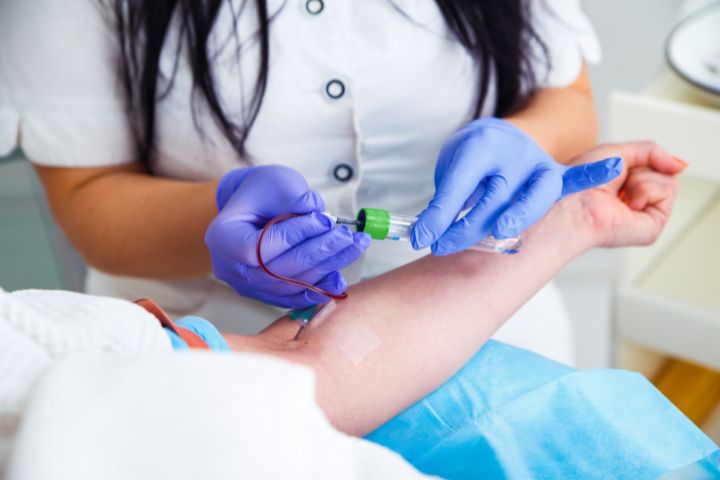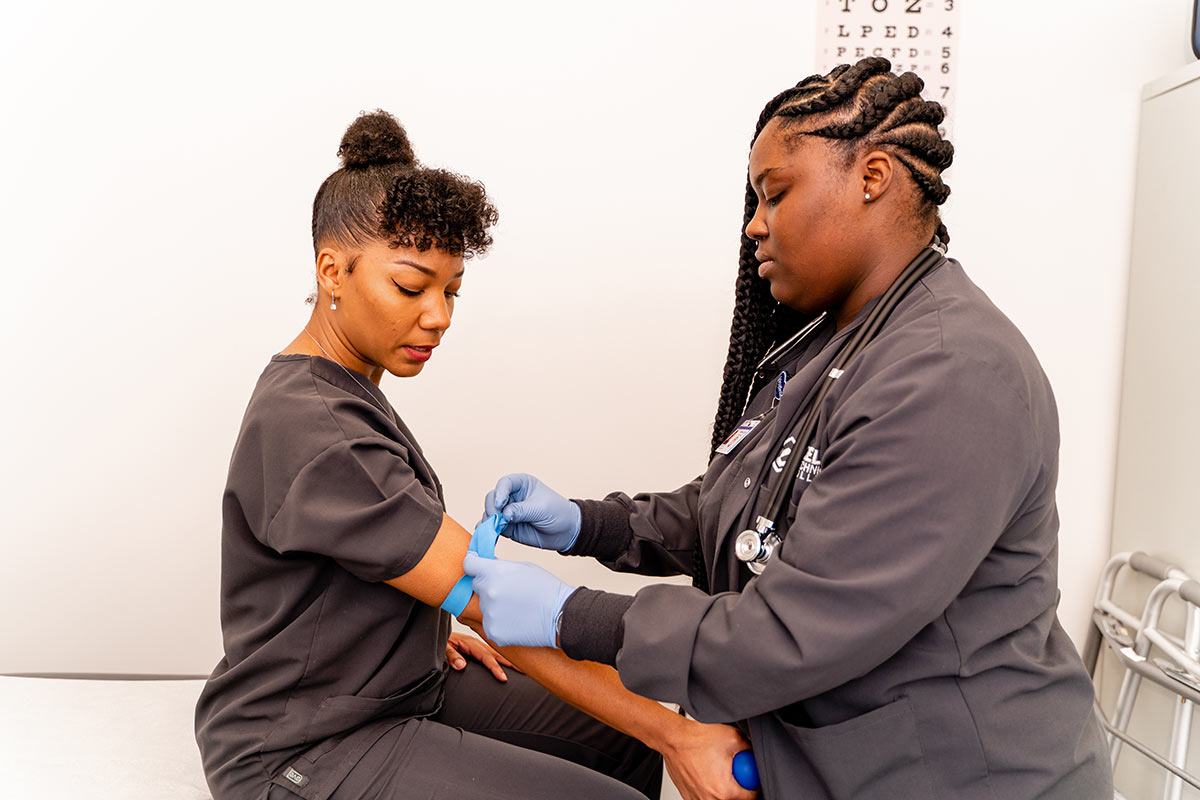The Path to Qualification: Comprehending the Phlebotomy Training Course Journey and Its Importance
As you consider the path to certification in phlebotomy, it's crucial to comprehend the duty you'll play in health care. Your training will certainly cover crucial skills, from blood collection methods to patient communication.

The Role of Phlebotomists in Health Care
Phlebotomists play a crucial function in the health care system, working as the important link in between patients and necessary diagnostic screening. You'll perform blood attracts, guaranteeing samples are gathered precisely and safely. Your knowledge helps in detecting medical conditions, monitoring health, and assisting therapy choices.
In your daily communications, you'll require to develop depend on with individuals, making them really feel comfy during what may be a demanding experience. You are in charge of identifying and taking care of samples very carefully to stop contamination or mistakes, which might affect examination outcomes.
Yet, you'll usually work along with physicians and registered nurses, interacting important information about patients' problems. Your duty is basic in maintaining the workflow in medical care setups, guaranteeing prompt and precise results. By grasping your skills, you contribute meaningfully to patient care, making you an important component of the clinical team. Welcoming this responsibility is key to your success as a phlebotomist.
Overview of Phlebotomy Training Programs
When checking out phlebotomy training programs, you'll find numerous types designed to fit various schedules and discovering styles. Each program aids you create essential abilities like blood collection and patient interaction. Comprehending these choices is key to choosing the ideal path for your occupation.
Sorts Of Training Programs
A number of types of training programs are readily available for those looking to come to be efficient in phlebotomy. Additionally, some health centers and facilities use on-the-job training programs, giving functional experience while you learn. Whatever path you pick, each program aims to furnish you with the needed abilities for an effective phlebotomy profession.

Secret Skills Created
Mastering phlebotomy calls for a set of crucial abilities that are developed via detailed training programs. Furthermore, communication skills are fundamental; you'll require to engage with people, discuss procedures, and placed them at ease. Each of these skills is necessary for your success as a qualified phlebotomist, making you a valuable asset in any type of health care setup.
Key Parts of a Phlebotomy Training Course
In a phlebotomy program, you'll concentrate on essential topics that lay the groundwork for your future career. You'll take part in hands-on training that allows you to use what you've discovered in real-world settings. Both the curriculum and functional experience are crucial for your success as a phlebotomist.
Core Educational Program Overview
While seeking a phlebotomy training course, you'll encounter a curriculum designed to equip you with essential abilities and expertise. Phlebotomy school. This educational program generally consists of anatomy and physiology, concentrating on the blood circulation system and comprehending blood components. You'll also learn more about various types of blood collection approaches, including venipuncture and capillary slit methods
Additionally, infection control and safety and security protocols are necessary components, ensuring you understand how to preserve a sterile atmosphere. You'll research patient interaction, emphasizing interaction and compassion, which are critical for relieving person anxiety. Lastly, moral and legal considerations will certainly be addressed, preparing you for real-world responsibilities. This foundational knowledge will allow you to excel as a phlebotomist and offer top quality care in scientific settings.
Hands-On Training Experience
Obtaining hands-on experience is an important component of your phlebotomy training course. This sensible training allows you to use what you have actually discovered in a real-world setting, boosting your skills and confidence. You'll practice venipuncture techniques, discover just how to manage various sorts of samplings, and get familiar with the equipment made use of in the area. Under the support of experienced teachers, you'll fine-tune your skills, guaranteeing you're prepared for any type of scenario you could encounter.
Additionally, you'll get the possibility to connect with clients, which is crucial for developing your interaction skills. This combination of technical proficiency and interpersonal abilities is important for your success as a certified phlebotomist. Eventually, hands-on training is where concept fulfills technique, solidifying your expertise and readiness for certification.
Accreditation and Licensing Demands
Before you can begin your career in phlebotomy, it is essential to understand the accreditation and licensing needs that differ by state. A lot of states call for phlebotomists to hold a certification from an acknowledged organization, such as the National Phlebotomy Association or the American Culture for Clinical Pathology. These accreditations usually entail passing a test that tests your understanding and abilities in the field.
Along with qualification, some states have details licensing demands. You may require to finish a certain variety of hours in medical method, submit proof of training, or go through a background check. It is very important to research your state's regulations to make sure you meet all necessary criteria.
Remaining informed regarding these review demands not only helps you secure a setting yet also improves your trustworthiness as a specialist. By satisfying these demands, you'll be well on your means to a successful profession in phlebotomy.
Hands-On Training and Practical Experience
Hands-on training and practical experience are vital components of your phlebotomy education, as they permit you to apply academic expertise in real-world scenarios. Throughout your training, you'll participate in monitored venipuncture, find out proper strategies, and become knowledgeable about different blood collection devices. This straight participation is important for building your self-confidence and honing your skills.
You'll work very closely with knowledgeable specialists who can lead you via the nuances of person communication and sample handling. Each practice session not just enhances your understanding yet likewise prepares you for the busy atmosphere of health care setups.
In addition, many programs include scientific turnings, permitting you to experience diverse settings, from health centers to outpatient clinics. This exposure helps you adjust to various difficulties and person requirements, guaranteeing you're well-prepared for your future function. Embrace these chances, as they're necessary to becoming a skilled and compassionate phlebotomist.
Challenges Faced During Training
While gaining hands-on experience is crucial, it's essential to recognize the obstacles that can develop throughout your phlebotomy training. Additionally, grasping the skills required for blood attracts takes practice; you may struggle with technique initially.
Time monitoring can also be a difficulty, as balancing theory, useful sessions, and personal commitments can feel daunting. You might deal with differing learning speeds amongst your peers, causing feelings of insecurity if you think you're falling back. Adapting to the various characters of teachers can be difficult, as each might have an one-of-a-kind mentor design.
Identifying these barriers early can prepare you for success and aid you develop durability throughout your training journey.
Occupation Opportunities After Accreditation

As you gain experience, you could also think about concentrating on locations like pediatric or geriatric phlebotomy, dealing with certain person needs. Some phlebotomists choose to advance their learn the facts here now occupations by ending up being laboratory service technicians or seeking more education in healthcare fields.
In addition, your accreditation can bring about duties in training or monitoring new phlebotomists, enabling you to share your understanding. With the healthcare industry constantly growing, your skills will certainly constantly remain in need, paving the means for a steady and satisfying occupation. Accept the opportunities waiting on you!
Regularly Asked Inquiries
What Is the Normal Period of a Phlebotomy Training Program?
Phlebotomy training courses usually last around 4 to eight weeks. You'll take part in hands-on method, classroom instruction, and on-line knowing. Finishing this training prepares you for accreditation and a fulfilling job in medical care.
Are Online Phlebotomy Courses Available?
Yes, on the internet phlebotomy courses are readily available. They supply versatility and benefit, permitting you to study at your very own pace. Just confirm the program is certified to meet qualification requirements and obtain valuable skills for your occupation.
Exactly How Much Does Phlebotomy Training Usually Cost?
Phlebotomy training usually sets you back between $700 and $2,500, depending content upon the program and place. You should think about aspects like program size, included materials, and hands-on experience when choosing the ideal training for you.
What Are Common Requirements for Phlebotomy Training?
Usual prerequisites for phlebotomy training usually consist of a high school diploma or GED, booster shots, and a background check. Some programs might likewise require standard healthcare expertise or qualifications, ensuring you're planned for hands-on training.
Can I Work While Completing My Phlebotomy Training?
Yes, you can work while finishing your phlebotomy training. Numerous students balance tasks with their researches, yet make specific to handle your time effectively to guarantee you satisfy both work and training dedications successfully.